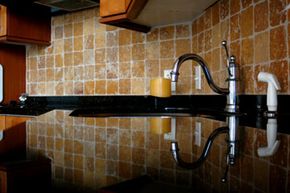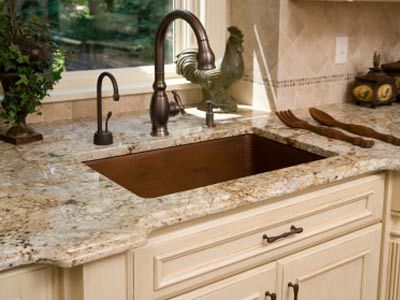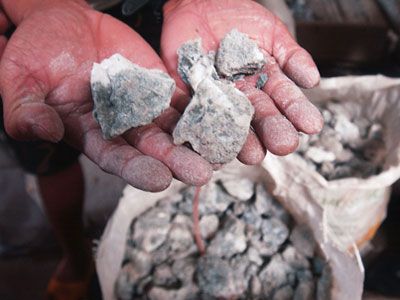Six years ago, my family and I moved into a model home with all the accouterments one might expect to find, including marble countertops in the master bath. To this day, I still don't think I've cleaned them properly (aside from the Mr. Bubble marathons that take place when my children convert the tub to a foamy swimming pool). Even if these surfaces weren't meant to be low maintenance, I've inadvertently forced them to be so.
According to Carol Courter, owner of Techline Furniture, Cabinets and Closets of Fort Worth, Texas, my marble countertops are overdue for some care. "Porous materials such as granite, marble and concrete need to be sealed regularly, about every six months," says Courter. Porous materials have minute surface holes that liquids may penetrate, leaving stains and eventually eroding or cracking the surface.
Advertisement
The fact that my home's marble isn't located in the kitchen was probably a saving grace. After all, I'm not likely to dish out stain-inducing pasta sauce in the bath. Things like tomato sauces and red wine could easily seep into a porous surface and cause a stain. "Porous countertops require extra attention if they are subject to acidic items like vinegar and lemon juice, which eat away the sealant prematurely," Courter adds.
So what should you install in areas likely to encounter such substances? Many homeowners opt for low-maintenance, stain-resistant nonporous countertops for the kitchen and bath, such as stainless steel, quartz and laminate. "Stainless steel countertops can handle the toughest environments," says Mark E. Wille, a sustainable materials consultant based in Chicago. Like manmade quartz and laminate, stainless steel is nonporous. At $75 to $200 per square foot (0.09 square meters) as of 2012, it can, however, be prohibitively expensive [source: Cost Helper].
Alena Capra, a certified kitchen and bath designer with the National Kitchen and Bath Association, says perhaps the most popular low-maintenance countertop is quartz, which is sold under brand names like Silestone, Cesarstone, Compaq or Hanstone. The cost for installed quartz countertops ranged from $50 to $150 per square foot in 2012, but it's the manmade product that most closely mimics the look of natural stone. "Quartz needs zero maintenance; it is heat-resistant and will not stain, even if it is the lightest of colors," Capra says.
Laminate countertops, such as Formica, are inexpensive ($15 to $25 per square foot, installed, as of 2012) and are made of plastic. Laminate, however, is prone to heat damage. And if heat damage does occur, the plastic will lift and separate, and possibly discolor; often, the entire countertop must be replaced [source: Consumer Search].
Wille recommends using nothing more than a bit of soap and water to clean countertops. "Porous and nonporous countertop surfaces often react poorly to chemicals. The best cleanser is soap, water and elbow grease."
Advertisement


